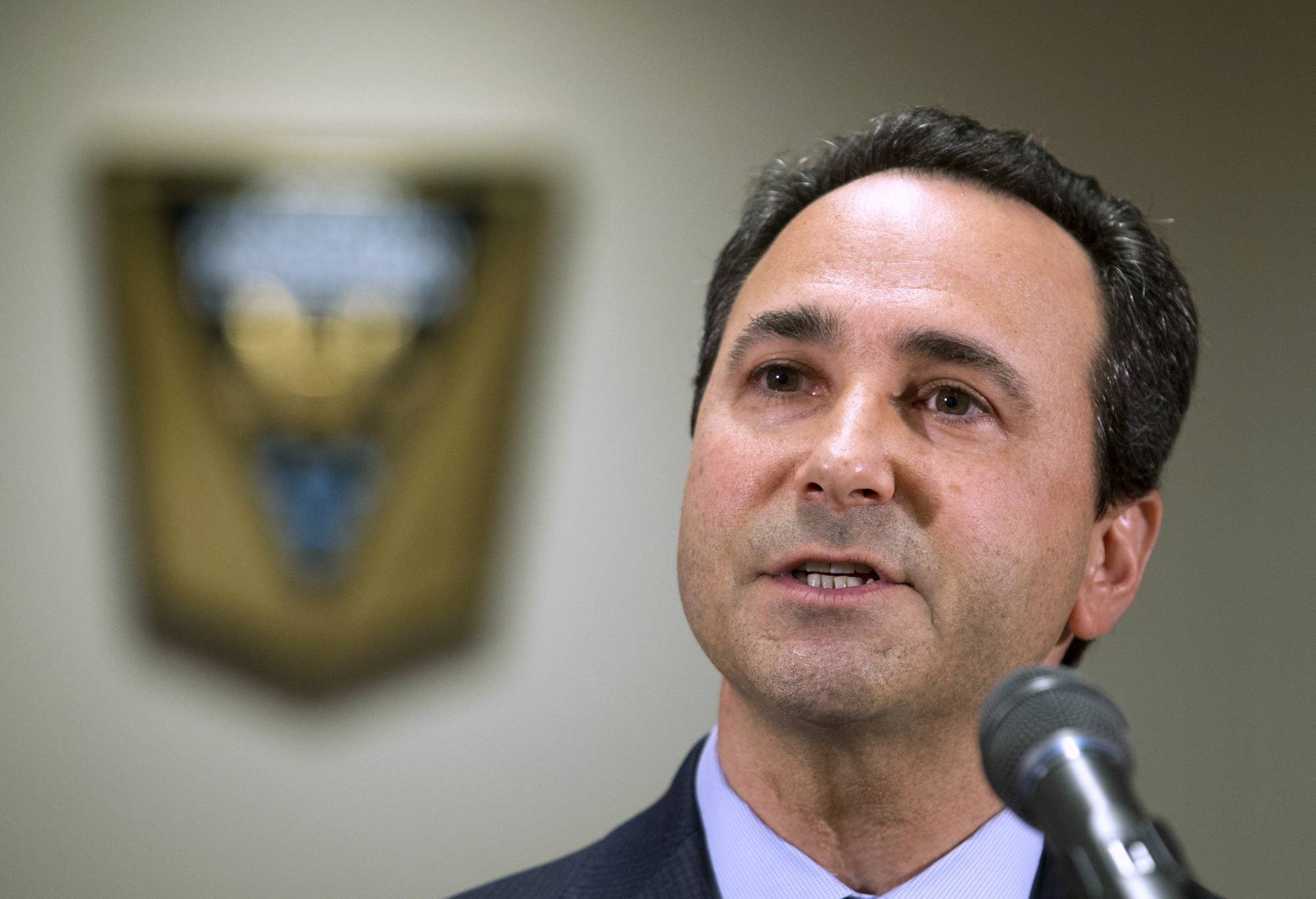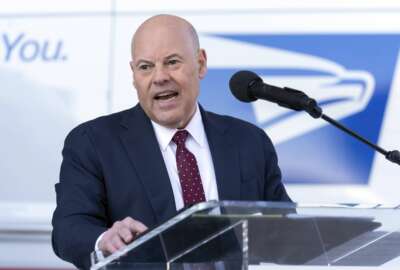Hubbard Radio Washington DC, LLC. All rights reserved. This website is not intended for users located within the European Economic Area.
On Air: Federal News Network
Trending:
USPS gives its regulator a budget boost – but not enough for ‘increased capacity’
The Postal Service’s regulator is getting a bigger budget to oversee a nationwide shakeup of the USPS delivery network — but it's not as big of an increase ...
UPDATE: This story was updated at 5:12 p.m. on Wednesday, Sept. 13 to include comments from Postal Regulatory Commission Chairman Michael Kubayanda.
The Postal Service’s regulator is getting a bigger budget to oversee a nationwide shakeup of the USPS delivery network — just not as big of an increase as it expected.
The USPS Board of Governors recently approved a $21.12 million budget for the Postal Regulatory Commission in fiscal 2024. USPS said that “combined with the PRC’s other resources,” the commission will have $27.2 million to spend next fiscal year.
The USPS Board of Governors held a closed-door meeting last Friday.
USPS said the commission’s FY 2024 budget is a 28% spending increase, compared to its estimated spending for fiscal 2023, and a 47% increase over the PRC’s actual expenses in fiscal 2022. The commission requested increased funding to oversee sweeping USPS network changes central to its 10-year Delivering for America (DFA) plan.
The commission, until recently, went through Congress to fund its budget each year. But the Postal Service Reform Act signed into law a year ago brought the PRC back to a system where the USPS Board of Governors approves its budget.
The commission requested a larger budget than usual to increase its capacity, after launching a public inquiry into USPS plans to reimagine its network of mail processing and delivery facilities across the country.
Among its questions, the regulator has called on USPS to shed more light on which of its facilities will be impacted by network changes, how these changes will cut costs, and whether USPS plans to close post offices or other facilities as part of its plans.
The PRC’s FY 2024 budget is nearly a 10% decrease from its initial FY 2024 budget request and more than a 6% decrease from a revised proposal it submitted a few weeks ago.
Agencies rarely get the level of funding they ask for each year. But the PRC is back to getting its funding from USPS at a time when the agency has pushed back against its public inquiry — and when Postmaster General Louis DeJoy has questioned whether USPS even needs a regulator.
DeJoy has rebuffed the regulator’s public inquiry into USPS network modernization plans, telling lawmakers that the probe will “put this whole plan in jeopardy.”
USPS said in its announcement Monday that DeJoy and Deputy Postmaster General Doug Tulino were not involved in the board’s vote to approve the PRC’s FY 2024 budget.
PRC Chairman Michael Kubayanda said in a statement Wednesday that he’s “disappointed” the USPS Board of Governors declined to fully fund the commission’s budget revised budget request.
“Most importantly, this process raised red flags about potential risks to the commission’s independence,” Kubayanda wrote.
The commission grew from 74 to 84 employees this fiscal year — including the creation of an analytics team staffed by four workers.
Kubayanda said the commission’s FY 2024 approved budget — a $0.5 million increase from current funding levels —won’t be enough to cover $2 million in increased costs next year, driven by higher rent and cost-of-living adjustments (COLAs) for its employees.
“Limiting the commission’s capacity will reduce the resources that the commission can dedicate to providing transparency into DFA and overseeing the Postal Service’s performance,” Kubanda wrote.
USPS said the spending levels it authorized for the PRC will allow the regulator to effectively conduct its oversight role.
USPS Board of Governors Chairman Roman Martinez IV said in a statement Monday that the board’s members “recognize and respect that Congress has created the PRC as an independent entity with specific regulatory responsibilities over the Postal Service, and that it needs to have the resources to effectively perform those responsibilities.”
“At the same time, the governors also recognize the need for responsible stewardship of the resources in the Postal Service Fund, which ultimately derive from users of the Postal Service,” Martinez said.
Kubayanda said stewardship of Postal Service funds is important, “even for small amounts relative to the size of the agency.”
“However, Congress did not intend for the Postal Service to determine the scope of its regulator’s activities,” he added.
Robert Taub, a longtime PRC commissioner, nominated by President Joe Biden to serve a third term, told members of the Senate Homeland Security and Governmental Affairs Committee last week that the PRC’s FY 2024 budget request is a “small amount, to recognize the important task that we have.”
“I would observe, where in the previous process that had existed, we did not have a postmaster general who was openly stating there was no need for a postal regulator and that it should be abolished,” Taub said. “I’m unaware that the nine governors either collectively or individually have publicly disavowed that perspective. And so, while they review our budget … we are in a bit of a different ecosystem than existed before.”
Taub said ongoing USPS network changes the commission is overseeing “may be the most fundamental change to the network since Ben Franklin was postmaster general.”
Committee Chairman Gary Peters (D-Mich.) said the Postal Service Reform Act was meant to “ensure the PRC’s independence and ensure strong oversight.”
“The PRC is an independent agency, and as a strong regulator must certainly maintain sufficient independence from the Postal Service,” Peters said.
Peters said that moving the PRC’s funding out of the congressional approval process allows it to keep operating, even during a government shutdown, “which, hopefully, we won’t have.”
Congress has until Sept. 30 to avert a government shutdown, by either passing a comprehensive spending bill for fiscal 2024 or a continuing resolution that temporarily keeps government funded at current spending levels.
The Postal Regulatory Commission said in a press release last week that it recently submitted a revised budget request of $22.613 million for FY 2024 to the USPS Board of Governors.
The commission said it submitted the revised budget request “in response to correspondence and discussions” with the USPS Board of Governors, regarding its initial budget request of $23.399 million.
The PRC said its revised budget request only covers increases in its fixed costs for fiscal 2024, “and does not fund increased capacity in fiscal 2024.”
Its initial request sought to fund increases to fixed costs, including inflationary adjustments to wages and benefits, lease payments and the addition of five full-time equivalent employees.
DeJoy, in an exclusive interview in July, said USPS was putting up with “nonsense” from the PRC’s public inquiry, and that the probe would draw out some of the agency’s most urgent reforms as it tries to turn around its long-term financial losses.
“Who is the Postal Service going after on this whole thing?” DeJoy said, adding that USPS is committed to meeting its service standards for on-time delivery of mail and packages. “We don’t need to be babysat.”
Kubayanda wrote in a white paper published in May by the Consumer Postal Council that DeJoy’s dissatisfaction with the postal regulatory system “presents challenges as well as opportunities for improvement.”
Kubayanda co-authored the white paper along with David Williams, a former USPS inspector general and a former member of the USPS Board of Governors, as well as former Rep. Tom Davis (R-Va.), who chaired the Oversight and Government Reform Committee from 2003 to 2007.
“The commission is working to be more agile in responding to these developments and there is an interest in becoming more proactive,” the authors wrote.
The PRC is working on a pilot program to enable centralized information management for its staff who produce analyses of USPS operations, has rolled out a new public-facing docket system and updated website, after receiving money from the Technology Modernization Fund.
The white paper’s authors, however, question whether any efforts to modernize the regulatory commission are enough to temper DeJoy’s criticisms.
“The postmaster general, for his part, wondered aloud whether the Postal Regulatory Commission is necessary,” they wrote. “The comment may have been made in jest and to prod the commission to act expeditiously, although he followed it up with scathing criticism of regulatory oversight during a congressional hearing.”
Copyright © 2024 Federal News Network. All rights reserved. This website is not intended for users located within the European Economic Area.
Jory Heckman
Jory Heckman is a reporter at Federal News Network covering U.S. Postal Service, IRS, big data and technology issues.
Follow @jheckmanWFED
Related Stories
DeJoy: USPS needs ‘long overdue’ network changes to keep up with reform goals
USPS improves on GAO’s High Risk List, but ‘not there yet’ fixing long-term finances
Related Stories
-
USPS regulator defends probe into ‘far-reaching’ network shakeup Agency Oversight





